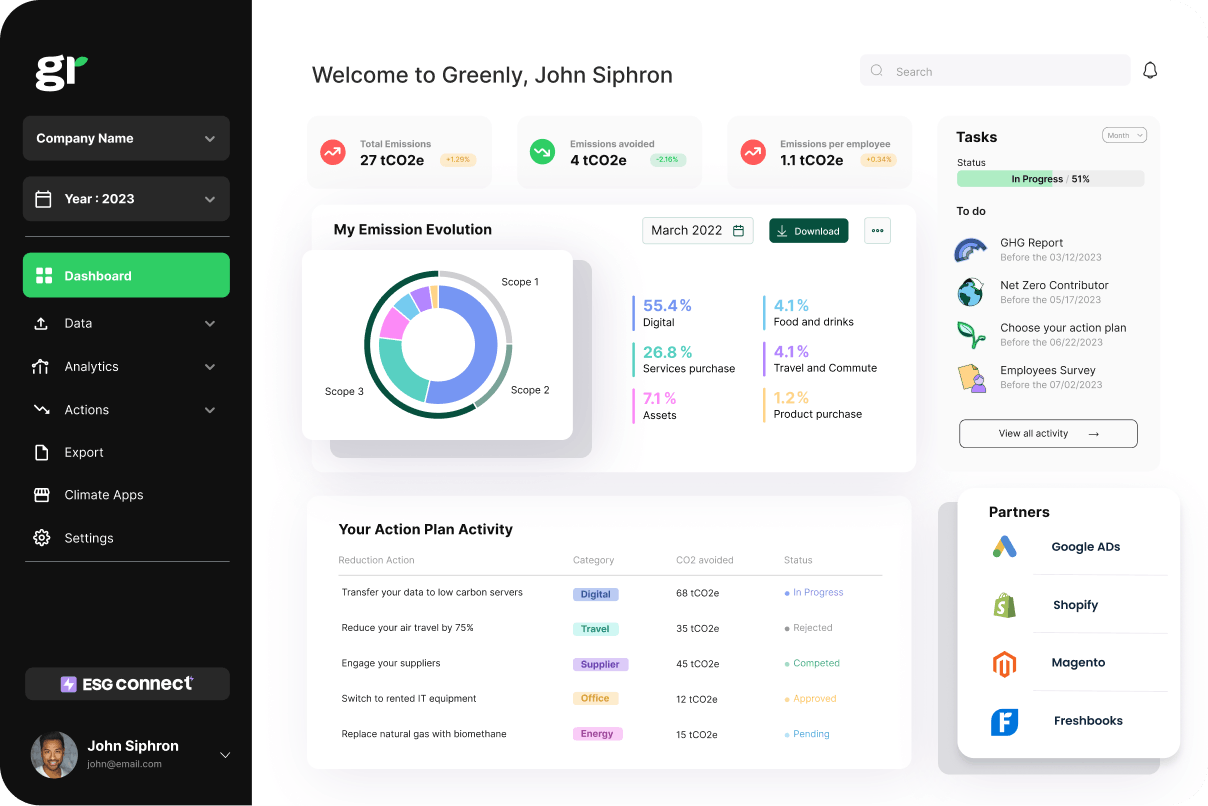
What are the 3 Pillars of Corporate Sustainability?
In this article, we'll explore what the 3 pillars of corporate responsibility are, why they're important, and how businesses can turn them into practical action.
ESG / CSR
Industries



More and more people in the US are becoming aware of the impact their carbon footprint has on the environment and are seeking ways to reduce their emissions. As the reality of climate change becomes clearer, individuals and businesses alike are starting to understand that everyone has a role to play in the green transition. One of the most effective ways to contribute to this shift is by switching to a green energy company. By choosing renewable energy, you can significantly lower your environmental impact, support the growth of sustainable technologies, and help drive the US towards a cleaner, greener future.
👉 In this article, we’ll explore the key factors to consider when selecting a green energy provider and introduce five companies leading the charge in delivering truly sustainable energy to US households and businesses.
Switching to a green energy company is one of the most impactful decisions individuals and businesses can make to reduce their carbon footprint. Energy production in the US is a major contributor to global greenhouse gas emissions, with fossil fuels like coal, oil, and natural gas accounting for the majority of electricity generation. As the US aims to meet its goal of achieving net-zero carbon emissions by 2050, the role of renewable energy is more important than ever.
By choosing a green energy provider, you're actively supporting the transition to a cleaner energy system. Green energy companies generate or source electricity from renewable sources such as wind, solar, and hydropower, which produce little to no carbon emissions. These renewable sources are also naturally replenished, making them a sustainable alternative to finite fossil fuels.
But the benefits go beyond reducing emissions. By supporting green energy companies, you help drive demand for further investment in renewable energy infrastructure and innovation. This not only supports the development of cleaner technologies but also contributes to the creation of green jobs and sustainable economic growth. Additionally, green energy can improve public health by reducing air pollution, which is a major cause of respiratory illnesses and other health problems.
However, it’s important to recognize that not all energy companies labeled as “green” are truly sustainable. In the next section, we’ll look at how some companies mislead consumers with greenwashing tactics, and what sets genuinely green companies apart.
While many energy companies market themselves as “green”, not all are as environmentally friendly as they claim. This practice, known as greenwashing, can make it difficult for consumers to distinguish between companies that are genuinely committed to sustainability and those that are simply capitalizing on the trend.
One common tactic used by some companies is offering what’s called a “green tariff”. These tariffs promise that the electricity you use is matched by an equivalent amount of renewable energy fed into the grid. However, this doesn’t always mean that the energy you receive is directly generated from renewable sources. In many cases, these companies still rely on fossil fuels for part of their energy production and merely offset the emissions by purchasing certificates known as Renewable Energy Certificates (RECs).
While RECs are a legitimate way to support renewable energy, relying solely on them without actively reducing fossil fuel consumption can be misleading. Companies that don’t generate their own renewable energy or invest in sustainable infrastructure are not contributing as much to the green transition as they could be.
On the other hand, truly green energy companies not only supply 100% renewable electricity but often reinvest their profits into building renewable infrastructure, such as wind farms or solar panels. They are transparent about their energy mix and make a real effort to reduce carbon emissions across their entire supply chain, including offering carbon-neutral gas options, which is much harder to achieve.
To ensure you're choosing a truly green energy company, it's essential to look beyond the marketing and understand how the company operates. In the following section, we’ll provide key tips to help you make an informed choice.
Choosing a green energy company requires more than just signing up for the first one that claims to be "100% renewable”. To make an informed decision, it’s important to dig a little deeper and consider a few key factors that distinguish genuinely sustainable providers from those that may be greenwashing. Here’s what to look out for:
The most important thing to consider is whether the company sources all of its electricity from renewable sources like wind, solar, and hydropower. Some companies might offer green tariffs but still rely heavily on fossil fuels. Check whether the provider is committed to generating or sourcing 100% renewable electricity, rather than just offsetting carbon emissions.
While electricity is relatively easy to make renewable, gas is a bit more complicated. Some green energy companies offer carbon-neutral gas, where the emissions from the gas used are offset by projects that reduce carbon elsewhere, such as tree planting. Others are pioneering green gas, which is produced from organic materials like food waste or farm byproducts. If you're keen to go green, look for a provider that offers renewable or carbon-neutral gas in addition to green electricity.
A truly green energy company will be transparent about where its energy comes from. They should clearly communicate their energy mix and how much of it is renewable. Look for certifications like the RECs (Renewable Energy Certificates) or other recognized labels that certify the company’s green credentials. Companies with a commitment to transparency and sustainability will have this information readily available on their website.
One of the best indicators of a green energy company’s commitment to sustainability is whether it reinvests profits into developing renewable infrastructure, such as wind farms or solar parks. Companies that take this approach not only provide green energy but actively contribute to the growth of the renewable energy sector, helping to accelerate the transition away from fossil fuels.
While going green might sound expensive, many renewable energy providers now offer competitive rates. Some companies are also committed to fair pricing and will not charge exit fees if you decide to switch. Look for flexible plans that don’t lock you into long-term contracts with penalties and that provide good value for your money while maintaining their commitment to renewable energy.
By keeping these tips in mind, you can confidently choose a green energy provider that aligns with your values and contributes meaningfully to the environment.

Now that we’ve explored why switching to a truly green energy provider matters and how to choose the right one, let’s take a look at five companies in the US that are making a real impact. These companies stand out for their commitment to sustainability, transparency, and innovation in the renewable energy space.
NextEra Energy, headquartered in Juno Beach, Florida, is the largest generator of wind and solar energy in the world. The company is committed to achieving net-zero emissions by 2045, largely through renewable energy projects like wind farms and solar installations across the US.
Founded in 1997 and based in Houston, Texas, Green Mountain Energy is one of the longest-standing renewable energy providers in the US. They offer 100% renewable electricity, sourced from wind and solar power.
Clearway Energy, headquartered in San Francisco, California, operates a wide range of wind and solar projects across the US. With over 9 GW of renewable capacity, they’re a major player in the green energy space.
With headquarters in Minneapolis, Minnesota, Xcel Energy is one of the largest utility companies in the US and has made significant strides in its renewable energy portfolio. They are on track to provide 100% carbon-free electricity by 2050.
First Solar, based in Tempe, Arizona, is a leading provider of solar power technology. Their advanced thin-film solar modules are designed to be highly efficient and environmentally friendly, with a lower carbon footprint compared to traditional solar panels.
| Company | Energy Source | Carbon-neutral Gas | Additional Features |
|---|---|---|---|
| NextEra Energy (US) | Wind, solar | No | Leader in battery storage technology, net-zero by 2045 |
| Green Mountain Energy (US) | Wind, solar | No | Sun Club initiative funds community projects |
| Clearway Energy (US) | Wind, solar | No | Plans to increase renewable capacity to 30 GW |
| Xcel Energy (US) | Wind, solar | No | Investing in electric vehicle infrastructure and energy storage |
| First Solar (US) | Solar (thin-film technology) | No | Lower carbon footprint solar manufacturing, net-zero by 2028 |
Switching to a green energy provider is one of the simplest and most effective ways to reduce your carbon footprint. Whether you're looking for 100% renewable electricity, carbon-neutral gas, or a company that reinvests in sustainable infrastructure, there are plenty of great options available in the US. Providers like NextEra Energy, Green Mountain Energy, Clearway Energy, Xcel Energy, and First Solar are leading the way in making renewable energy accessible and impactful.
By considering factors such as transparency, sustainability credentials, and pricing, you can select the company that best aligns with your values and energy needs. The move to a greener energy source not only benefits the environment but also helps you support the broader transition to a low-carbon future.
Switching to a green energy provider isn’t just beneficial for individuals – businesses can also play a pivotal role in reducing their carbon footprint by making sustainable energy choices. For companies looking to go beyond energy and make a broader impact on their emissions, Greenly offers a range of solutions to help you achieve your sustainability goals.
At Greenly, we provide businesses with the tools and strategies they need to minimize their environmental impact. Our advanced carbon management platform allows companies to track, analyze, and reduce their greenhouse gas emissions efficiently.
Supply chain emissions (Scope 3) are often the hardest to manage but play a crucial role in achieving net-zero targets. Greenly helps companies engage with suppliers to transition toward low-carbon alternatives, creating more sustainable supply chains and reducing overall emissions.
Greenly’s intuitive platform streamlines the process of managing your company’s carbon emissions. From calculating emissions to tracking progress against ESG goals, our platform integrates sustainability seamlessly into your business operations.
Greenly offers end-to-end support, from emissions tracking to supply chain decarbonization, positioning your business as a sustainability leader. Partner with Greenly to reduce your environmental footprint and drive meaningful change in the fight against climate change.
Start your journey to a greener, more sustainable future with Greenly today.
